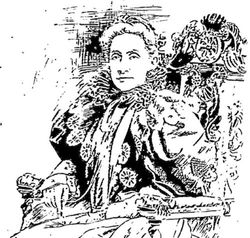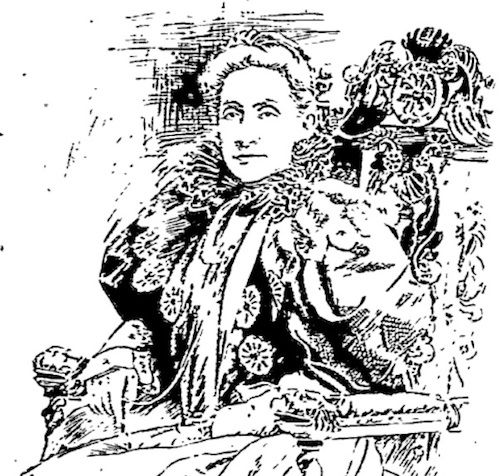As a teenager, Helen attended meetings about women's rights with her mother and self-identified with the women's cause:
"I was born to an inheritance of appreciation and sympathy for the cause of women's rights, my mother before me being so ardent a supporter of its doctrines that I felt myself, in a measure, identified with it. Among my earliest recollections are the Sunday afternoon meetings, held at the home of Lucretia Mott, on Arch street, in Philadelphia. On one of those occasions, I heard that eloquent advocate of human freedom, the English abolitionist, George Thompson.
As an adult, Cook attended the first suffrage convention held in Washington, D.C., in January 1869, and organized by the Universal Franchise Association.
In 1864, Helen Appo married John Francis Cook, Jr., an educator and tax collector in Washington, D.C. Together, they had five children. The Cook family was one of the most prominent and wealthy Black families in the Nation's Capital at the time. Her in-laws were known for their work in education, religion, politics, and community service.
Upon moving to Washington, D.C., Helen Appo Cook took an interest in the situation of Black women. In 1892, she began working with the Colored Women's League and became its first president, a role that she would continue to fill until 1903. The purpose of the Colored Women's League was to collect facts regarding the moral, social, and intellectual development of Blacks, to foster unity, to encourage progress, and to determine how best to promote the interests of Blacks. The League also held sewing classes, mothers' meetings, garden parties to raise funds for day nurseries, and offered night classes to Black mothers.
In 1895, Cook traveled to Boston where she attended the First National Conference of Colored Women of America. The conference was called in response to an assault on the character of Black women by the Missouri Press Association, and lasted for three days. Cook was elected Vice President of the conference, and on July 29th, addressed her peers, calling for unity among Black women through the creation of a national league. As a result of the conference, the National Federation of Afro-American Women was created with the goal of restoring the reputation of all Black women across the country. A year later, in 1896, Cook's vision of a national league came to fruition when the Colored Women's League and the National Federation of Afro-American Women consolidated under the National Association of Colored Women. The consolidation was the result of much negotiation between the two clubs concerning leadership.
In 1906, at the age of sixty-nine, Cook continued her reform efforts by joining the Niagara Movement, led by W. E. B. DuBois. The Niagara Movement explicitly and forcefully condemned racial discrimination and segregation. Its members, like Helen Cook, demanded economic and educational opportunities, as well as the right to vote for both Black men and women.
Helen Appo Cook died of pneumonia and heart failure on November 20, 1913 in Washington, D.C.
As a teenager, Helen attended meetings about women's rights with her mother and self-identified with the women's cause:
"I was born to an inheritance of appreciation and sympathy for the cause of women's rights, my mother before me being so ardent a supporter of its doctrines that I felt myself, in a measure, identified with it. Among my earliest recollections are the Sunday afternoon meetings, held at the home of Lucretia Mott, on Arch street, in Philadelphia. On one of those occasions, I heard that eloquent advocate of human freedom, the English abolitionist, George Thompson.
As an adult, Cook attended the first suffrage convention held in Washington, D.C., in January 1869, and organized by the Universal Franchise Association.
In 1864, Helen Appo married John Francis Cook, Jr., an educator and tax collector in Washington, D.C. Together, they had five children. The Cook family was one of the most prominent and wealthy Black families in the Nation's Capital at the time. Her in-laws were known for their work in education, religion, politics, and community service.
Upon moving to Washington, D.C., Helen Appo Cook took an interest in the situation of Black women. In 1892, she began working with the Colored Women's League and became its first president, a role that she would continue to fill until 1903. The purpose of the Colored Women's League was to collect facts regarding the moral, social, and intellectual development of Blacks, to foster unity, to encourage progress, and to determine how best to promote the interests of Blacks. The League also held sewing classes, mothers' meetings, garden parties to raise funds for day nurseries, and offered night classes to Black mothers.
In 1895, Cook traveled to Boston where she attended the First National Conference of Colored Women of America. The conference was called in response to an assault on the character of Black women by the Missouri Press Association, and lasted for three days. Cook was elected Vice President of the conference, and on July 29th, addressed her peers, calling for unity among Black women through the creation of a national league. As a result of the conference, the National Federation of Afro-American Women was created with the goal of restoring the reputation of all Black women across the country. A year later, in 1896, Cook's vision of a national league came to fruition when the Colored Women's League and the National Federation of Afro-American Women consolidated under the National Association of Colored Women. The consolidation was the result of much negotiation between the two clubs concerning leadership.
In 1906, at the age of sixty-nine, Cook continued her reform efforts by joining the Niagara Movement, led by W. E. B. DuBois. The Niagara Movement explicitly and forcefully condemned racial discrimination and segregation. Its members, like Helen Cook, demanded economic and educational opportunities, as well as the right to vote for both Black men and women.
Helen Appo Cook died of pneumonia and heart failure on November 20, 1913 in Washington, D.C.
Gravesite Details
Originally buried in the old Columbian Harmony Cemetery in Washington, DC, but believed to have been re-interred, with about 37,000 others, in the National Harmony Memorial Park in Prince George's County, Maryland, in 1960.
Family Members
Sponsored by Ancestry
Advertisement
Advertisement




